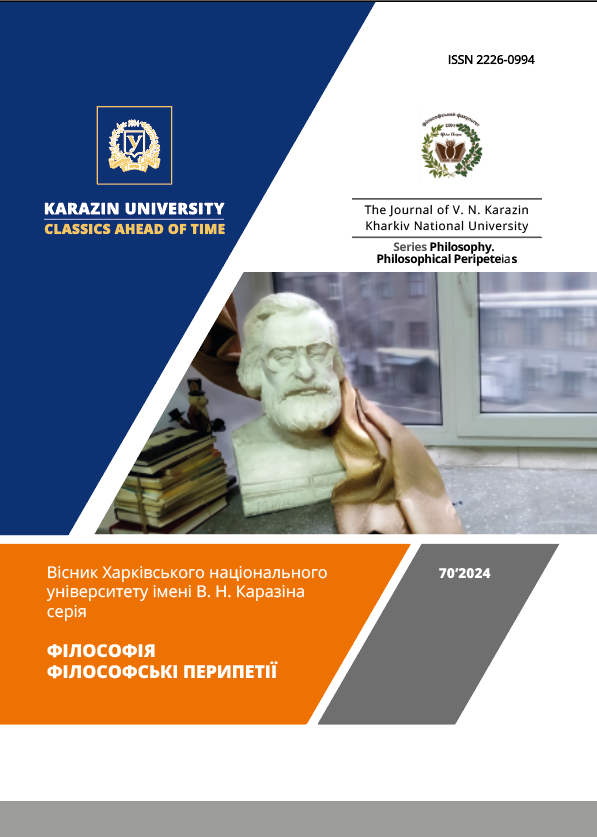GUY DEBORD’S DERIVE AS AN EMANCIPATORY GAME
Abstract
This article examines the concept of Guy Debord's "dérive" as both a playful practice and a concept. The tendency toward post-postmodernism is defined as a direct turn to the individual, reinterpreting sincerity, irony, and emotionality. This is a reaction to the postmodern anti-humanism, most fully embodied in the philosophy of poststructuralism. The new era obliges us to revisit old authors to understand itself. The article systematically argues that Guy Debord is an author who can be reinterpreted in the context of post-postmodernism. For this purpose, a new interpretation of the philosopher's work is proposed, placing the concept and practice of dérive at the center of his thought. Thus, the article ignores "The Society of the Spectacle" to the extent possible. Dérive is considered as a play. This interpretation does not deviate from Guy Debord's own thinking, as he was familiar with the works of Johan Huizinga, and they were highly esteemed by him. Debord viewed play as a space alternative to seriousness. Seriousness, in his philosophy, was constructed by the capitalist system, which is the society of the spectacle. Dérive, in Guy Debord's philosophy, was a revolutionary practice aimed at overcoming the society of the spectacle. This article questions the revolutionary potential of dérive. Dérive, in its essence, is a practice of gaining new experiences that break through the alienation of the society of the spectacle. This experience is individual, so it cannot be the basis for a revolution that requires a unifying idea. Therefore, the article considers dérive as an emancipatory game, as there is a demand in society to exit the system constructed by capitalism, which is evident in the realm of entertainment, which mostly satisfies the demand for escapism. Thus, Guy Debord is recontextualized in the context of the current era of post-postmodernism, characterized by a return to individuality and by a demand for an exit from the capitalist paradigm.
Downloads
References
Andreotti, L. (1999) Unitary urbanism: Play-tactics of the Internationale Situationniste (1957-1972) Rome: ACSA international conference
Architecture and play. (1955) (G. Denis, Trans.) Retrieved from https://www.cddc.vt.edu/sionline/presitu/andplay.html
Debord, G. (1956) Theory of Derive (J. Kulish, Trans.) Retrieved from: https://kontur.media/drift_theory/#one. (In Ukrainian).
Debord, G. (1956) Two accounts of the Derive (T. Y. Levin, Trans.) Retrieved from https://www.cddc.vt.edu/sionline/presitu/twoaccounts.html
Debord, G. (1956) Preface to Potlach (1954-1957) (R. Keehan, Trans.) Retrieved from: https://www.cddc.vt.edu/sionline/postsi/potlatchpreface.html
Gilman-Opalsky, R. (2011) Spectacular Capitalism. Guy Debord and the Practice of Radical Philosophy. New York: Autonomedia
Merrifield, A. (2005) Guy Debord. UK, Islington: Reaktion Books Ltd
Penner, D. (2015) Guy Debord and the politics of play. In Breaugh M. Holman C. Magnusson R. Mazocchi P. Penner D. (Ed.) Thinking radical democracy. The return to politics in Post-war France. (pp. 165-186) Toronto, Canada: University of Toronto Press. https://doi.org/10.3138/9781442621992-008
Plant, S. (2002) The most radical gesture. The Situationist International in a postmodern age. UK, Oxfordshire: Taylor & Francis e-Library
Ross, K. Henri Lefebvre on the Situationist International. Interview (1983) Retrieved from https://www.notbored.org/lefebvre-interview.html
Russell, E.-J. (2022). Guy Debord, an Untimely Aristocrat. Theory, Culture & Society, 39(5), 103-125. https://doi.org/10.1177/02632764211069298.
Copyright (c) 2024 Антон Алексеєнко

This work is licensed under a Creative Commons Attribution 4.0 International License.
Authors who publish with this journal agree to the following terms:
- Authors retain copyright and grant the journal right of first publication of this work under the terms of a license Creative Commons Attribution License 4.0 International (CC BY 4.0).
- Authors are able to enter into separate, additional contractual arrangements for the non-exclusive distribution of the journal's published version of the work (e.g., post it to an institutional repository or publish it in a book), with an acknowledgement of its initial publication in this journal.
- Authors are permitted and encouraged to post their work online (e.g., in institutional repositories or on their website) prior to and during the submission process, as it can lead to productive exchanges, as well as earlier and greater citation of published work.






3.gif)




